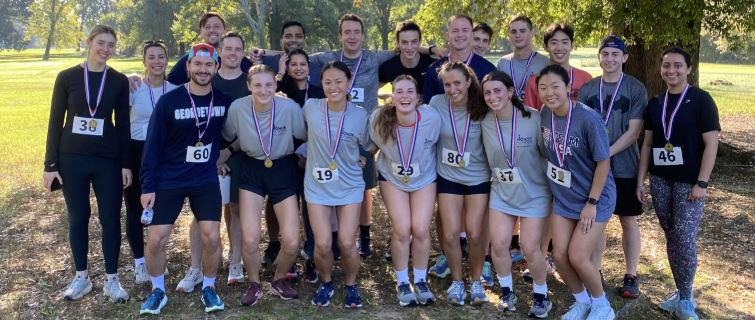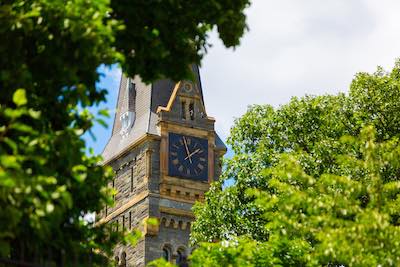
This article is from the 2023–2024 Dean's Report.
St. Ignatius of Loyola, who founded the Jesuit religious order more than 500 years ago, reflects the journey of many SCS students today—especially the veteran population.
The 16th-century saint served as a Spanish soldier and became a wounded warrior; his prolonged recovery was one of the significant factors that led to his spiritual awakening and continued education. Like St. Ignatius, SCS students draw strength from their experiences, embracing challenges as opportunities for growth that lead to a path of lifelong learning.
Centuries later, one of the many ways Georgetown continues to honor St. Ignatius’ legacy is by supporting the brave individuals who have served the nation. Today, SCS is home to one of the largest veteran populations at the University. In the past academic year, there were 640 military-connected students enrolled, constituting about 18 percent of SCS’s degree student population. From continuing military careers to transitioning to a new chapter in civilian life, SCS offers a variety of resources and opportunities for military-connected members to flourish amidst waves of change.
For more than 75 years, the U.S. Armed Forces has been among the most diverse organizations in the country. The unique perspectives shaped by military life enrich learning at SCS and elevate the entire University community. Veterans consistently demonstrate teamwork, resilience, and a commitment to service in the classroom and beyond—embodying the values that bring Georgetown to life.
Meeting Veteran Students’ Needs
Tahina Montoya, DLS, a graduate of the Doctorate of Liberal Studies program, served 12 years as an intelligence officer in the U.S. Air Force, including deployments to Qatar and Kyrgyzstan. A dedicated military officer, wife, and mother, Montoya reached a crossroads: balancing a demanding career with her growing family’s needs.
“This is where Georgetown played a role in my life—when I found myself eight months pregnant with our second child,” she said.
At that time, her husband, who currently serves as a Navy commander, was selected to serve as the Naval Attaché for the U.S. Embassy in Panama—a dream assignment for the family. However, Air Force positions were not available in that area for Montoya. Juggling the demands of military life, motherhood, and the uncertainty of a new chapter led Montoya to transfer to the Air Force Reserves.
— Dr. Tahina Montoya
Shortly after, she began her SCS application but paused midway, doubting whether a doctoral program was the right fit for this pivotal moment in her life or if she was competitive enough to be accepted. One month before the submission deadline, the Military and Veterans’ Resource Center (MAVRC) noticed her application was pending and called to offer support.
“They were the ones who encouraged me to finalize my application,” Montoya recalled. “I was completely floored when I found out I had been selected because I did not think it was possible.”
With the help of resources like MAVRC, the Student Veterans of America, and her Post-9/11 GI Bill®, SCS helped Montoya continue her commitments to service and family. In recognition of her academic excellence and contributions to the Georgetown community, Montoya received the 2024 Tropaia award for her program—the most prestigious accolade a student can achieve at SCS. Montoya continues to engage with the University community by mentoring students through the Advancing Women’s Empowerment program.
An Extensive Support Network
Embodying the Jesuit value of Cura Personalis, i.e. “Care for the Whole Person,” SCS and MAVRC guide military-connected students on how to enter their next chapter academically, mentally, and spiritually.
“Among SCS admission staff, I’ve seen genuine care and passion to help. Within the MAVRC office and University at large, we really try to help students by showing them how their experiences translate into their next step,” said Stephan Murphy, MAVRC director, Army veteran, and current Army reservist.
According to Murphy, SCS is a great fit for veterans because each program is designed for working professionals. The programs allow veterans to tend to their daily duties while continuing school full-time or part-time.
"Having that ability to continue to progress professionally, in addition to developing academically, is a unique benefit that you really get in the SCS model,” Murphy said. “The degree offerings are tailored toward real-world professional interests to help develop your professional resume for the next step.”
In addition to working closely with MAVRC, SCS has partnered with the Dog Tag Fellowship Program for the past ten years. Emphasizing entrepreneurship, the five-month certificate program equips veterans, military spouses, and caregivers with tools and education to build resilience, find renewed purpose, and forge community beyond the military. The School also expanded its Yellow Ribbon Program (YRP), significantly increasing the financial support available to eligible military students by removing the tuition cap. Additionally, there is no limit on the number of students eligible to participate.
Swarnajeet Das, a master’s student in the Information Technology Management program, served in the Army for nearly four years. When he was 12, Das immigrated with his parents from India to the U.S., which inspired him to serve the country.
— Swarnajeet Das
“My parents provided me with food, shelter, clothing, everything—but this country, in my eyes, provided them the opportunity to provide those things for me; it’s my way of giving back,” Das said.
Das chose SCS for its strong military support and personalized attention, which helped him transition back to academic life after a seven-year gap from higher education. A “Person for Others,” Das is committed to helping fellow veterans understand available resources, like the YRP, and how to navigate their academic experiences by serving as a MAVRC advisor.
“The amount of support and resources that SCS provides students is immense,” Das said. “Since I am 100 percent eligible for my post-9/11 GI Bill®, I would be eligible to receive Yellow Ribbon Program benefits if my GI Bill® is exhausted.”
Today, military-connected students bring the University’s commitment to “Community in Diversity” and academic excellence to life. “Everyone brings something to the table,” Das noted. “In the military, you have to be organized and structured, which enhances the learning environment when applied in the classroom.”
Leveraging Military Experience into a Civilian Career
Stephen Shaw served in the Army as a logistics officer for seven years, with assignments that took him across the United States and abroad to Korea and Poland. This global experience motivated him to pursue a new path in the Master’s in Urban & Regional Planning program.
At SCS, Shaw found support through the YRP, MAVRC, and a network of fellow students committed to contributing to the greater good, fueling his excitement to build a career that extends his service beyond the military.
“I appreciate the service-oriented model that my program at SCS has—it’s a life calling. It’s a mission.” Shaw said. “That resonates with me as a veteran and shapes my outlook moving forward.”
Inspired by his travels, Shaw is now focused on transportation planning, drawing on the diverse urban experiences he encountered around the world. He aims to bring global innovations to enhance city planning across the country, while embodying his values of service to build safer communities in the future.
“Sustainable, walkable communities benefit everyone—people, the planet, fostering connection and togetherness,” he said. “We really are all in this together, and we’re building it for everyone.”
Supporting veterans and their families at SCS not only brings Georgetown’s values to life but also shapes our future, inspiring lifelong learners to strive for excellence in every chapter of their lives.
— Stephen Shaw
